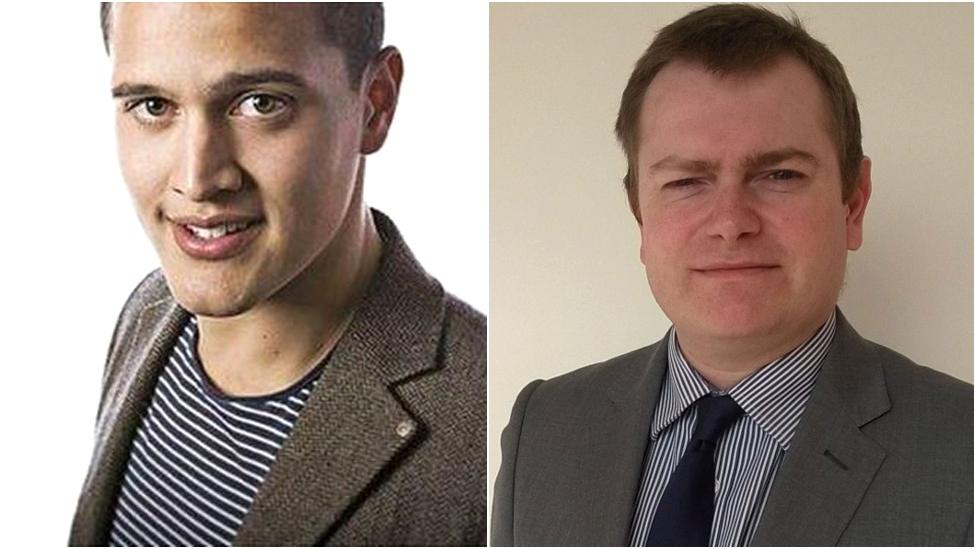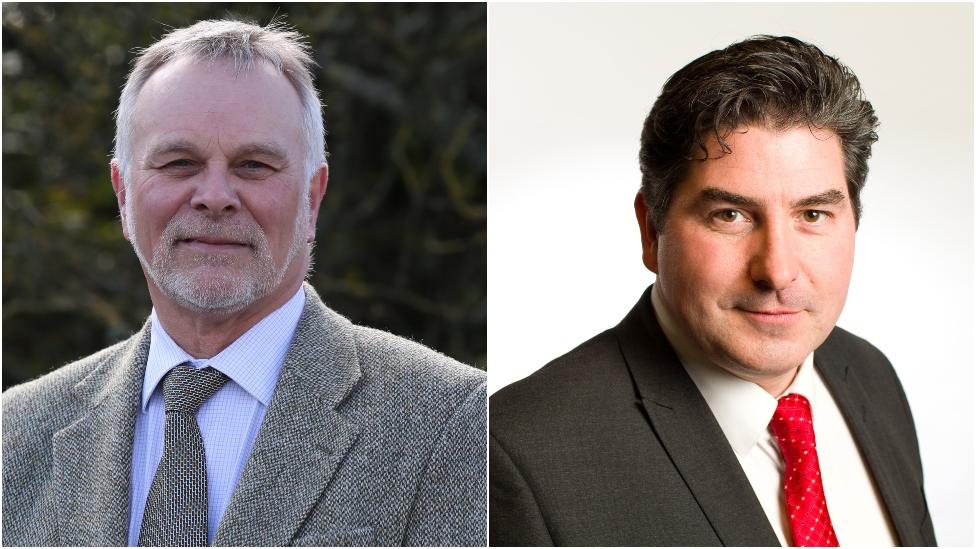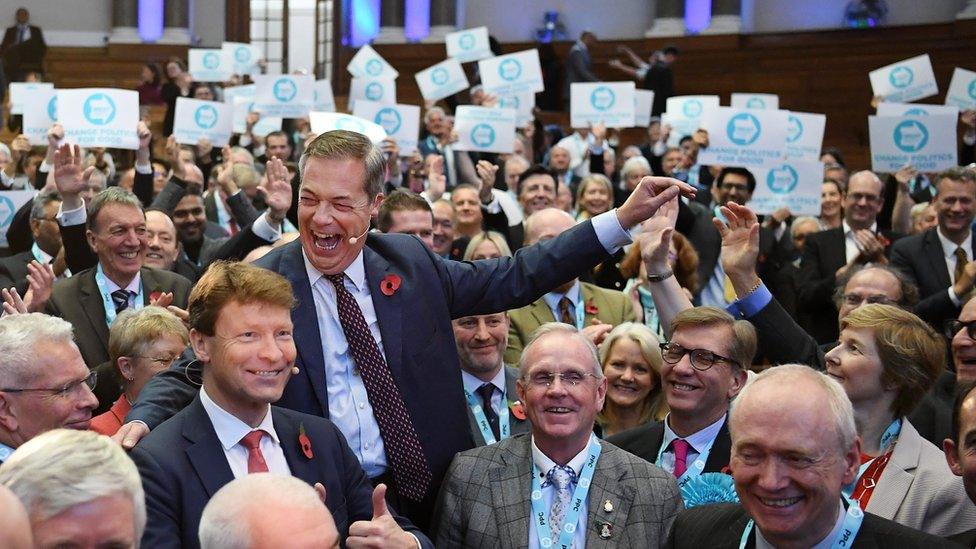General election 2019: The candidates who fell at the first hurdle
- Published

The deadline for wannabe MPs to throw their hats into the ring passed on Thursday afternoon - but some didn't even make it that far.
Up and down the country, candidates for the 2019 general election were forced to pull out of the race - and be replaced - before getting their names on ballot papers.
The stories behind these party-managed deselections are all different. But while some candidates have been forced to step down for more traditional reasons, such as policy differences with their parties, many have found themselves hostages to their past lives on social media.
Of the 23 identified by BBC research to have stood aside in the run-up to the deadline, about a third did so because of some kind of past online transgression.
Seven of Labour's selections lost their status in the run-up to the 14 November deadline.
Art critic Matthew Collings had secured his place in South West Norfolk until allegations were made about posts on his social media accounts dismissing claims of anti-Semitism in the party as a "witch hunt" and describing a former chief rabbi as a "notorious hate-filled racist". He denied posting anything that "could possibly be anti-Semitic" but was removed just a day after his nomination.
Kate Ramsden was due to run in Gordon, Aberdeenshire, until the Jewish Chronicle highlighted a blog post from her in which she compared Israel to an abused child who becomes an abusive adult. The party withdrew its support and she quit.
And Frances Hoole lost her candidacy in Edinburgh South West over a social media post showing her with a bottle of Cillit Bang cleaning spray pointed towards an image of her SNP rival Joanna Cherry.

Kate Ramsden (left) and Sally Gimson (right) had been selected by Labour
The next three candidates were knocked out for different reasons. Gideon Bull, who was set to run as a candidate in Clacton, Essex, stood down after admitting to using the Jewish slur "Shylock" in a private council meeting - though he said he hadn't realised it was offensive.
Sally Gimson was selected by local members to run for the seat of Bassetlaw, Nottinghamshire, but then removed by Labour's National Executive Committee (NEC) after complaints from members of another local party where she used to be a councillor. And Laura Davies - who ran for the party in both 2015 and 2017 - was deselected by the NEC for the Shrewsbury seat after she disagreed with her local party over plans to shake up hospital provision in the area.
Finally, Ed Murphy was ditched as Labour candidate in Cambridgeshire North West at the last minute before the deadline - with no reason made public by the party.
Three of the candidates chosen by the Conservative Party lost their chances to run before Thursday's cut-off point. Former BBC presenter Nick Conrad stood down after critics attacked comments he made on the radio in 2014, saying women should "keep their knickers on" in a discussion on rape.

Nick Conrad (left) and Antony Calvert (right) were chosen as candidates for the Conservatives
Antony Calvert had been due to run for the seat of Wakefield, but Facebook posts were discovered where he criticised the appearance of his Labour rival, Mary Creagh. Mr Calvert also said if the deceased Libyan dictator Col Muammar Gaddafi had wanted to walk the streets unrecognised "he should surely have fled to Bradford". He said the posts were more than 10 years old and had not intended to cause offence - but still had to step down.
The former MP for Brecon and Radnorshire, Chris Davies, had been chosen as the candidate for Ynys Mon. But he pulled out after some of his fellow Welsh Tories criticised his candidacy because of a previous conviction for claiming false expenses.
And, in the Scottish constituency of Aberdeen North, Conservative candidate Roger Houghton has been suspended from the party. over alleged anti-Semitic, Islamophobic and homophobic comments. He will remain a candidate, but without the party's support.
The Liberal Democrats have lost five of their selected candidates. Two went in September, even before the mad rush to get all the seats covered.
Galen Milne stood for the party in Banff and Buchan in 2017 and had been due to run again. He was deselected after posting on social media that Tories should be "burned at the stake". Kirsten Johnson bowed out of running in North Devon over a race row that erupted after an interview she gave on BBC radio.

Galen Milne (left) and Rob Flello (right) were chosen to run for the Lib Dems
Kevin McNamara had been the Lib Dem's candidate in Thurrock until he resigned after social media posts of his from a decade ago were shared, allegedly containing homophobic and racist comments. Rob Flello used to be a Labour MP for Stoke-on-Trent South, and had been set to run for the Lib Dems in the same seat - until the party discovered he had voted against gay marriage and gay adoption. They said his values "greatly... diverge from ours".
For Tim Walker, the decision to stand down was more political. He decided not to be the Lib Dem candidate in Canterbury as he did not want to split the Remain vote between himself and Labour's Rosie Duffield, who had only won the seat from the Tories by 187 votes.
The Brexit Party decided not to run candidates in the end in 317 Conservative seats. Besides this, eight of its candidates have been deselected or stepped aside for other reasons.
The party's "Workington Man" Philip Walling was removed from running in the constituency after he took to Twitter to back Boris Johnson's deal. This was before Brexit Party leader Nigel Farage moved towards the PM's view. Jill Hughes had been due to stand in the Yorkshire seat of Batley and Spen, but stood down after social media posts revealed some unusual beliefs, including a claim that extra-terrestrials were working with world governments in a "hush-hush" arrangement.

Nigel Farage held a rally for his prospective parliamentary candidates earlier this month
Prabhjit Dhillon was going to take on Warwick and Leamington for his party - but gave up the candidacy after posts were discovered on his social media, saying "moderate Muslims... sit back and look the other way while jihadists fight".
Calum Walker quit from running in SNP-held Dundee East after Mr Farage's decision to stand down 317 candidates in Tory-held seats. He tweeted that he feared splitting the Leave vote in the area could lead to a Labour government "propped up by the SNP".
Louis Stedman-Byrce pulled out in Labour-held Glasgow North East for the same reason.
On deadline day, Rupert Lowe decided not to contest Labour-held Dudley North for fear he would "split the vote" with the Tories, and allow Labour back in. Andy Wood also pulled out in Hove, urging voters to back the Conservative candidate.
Finally, Owen Prew was not nominated in Canterbury - where he had been expected to run. The reason is not clear.
In many of these cases, it's clear social media is proving a check on people's ambitions for public life. Tweet dredging - going through people's social media history to look for incriminating posts - has grown massively. And it's not just in politics, says the BBC's digital elections reporter Joe Tidy.
"Just ask the actor and comedian Kevin Hart who lost his dream job of Oscars host last year thanks to the internet unearthing homophobic jokes from the actor's dusty old Twitter archive," he says.
So the 2019 election was undoubtedly going to see the effects.
"The methods have improved a great deal because of how much more schooled on internet use everyone has become," said Tidy. "Every year, more and more people are graduating from 'the school of the internet' - able to carry out bulk searches of Twitter, Facebook and Instagram pages to dredge up stuff that has long been forgotten about. "
Many of such controversial comments were posted several years ago at a time when both the posters and the internet were less enlightened, so, he says, "you can see how easy it is for careers to crumble".
There is some talk in the tech world of an "auto-delete" function to permanently erase posts after two or three years. Tidy says this could reduce the chances of people's careers being ruined by silly youthful outbursts online.
"Then again," he adds, "some argue that these glimpses into the past are a useful insight into the true characters of the people being thrust into public life."
So has there been an unusual rise in candidates standing down before this election? That is statistically very hard to work out, says our political correspondent Jessica Parker.
"There are no official records and it's worth remembering that people can pull out, under the radar, for all sorts of unremarkable reasons," she says. "After rows about allegations of anti-Semitism in Labour and Islamophobia in the Conservatives, parties feel under pressure to show a zero-tolerance approach."
Brexit is another ingredient, she says, leading, as it does, to people withdrawing so as not to split the Leave or Remain vote.
Maybe it won't be like this forever. Parker says would-be politicians may learn to be more cautious online.
"But whether Brexit will continue to test party loyalties in the same way: well," she concludes, "that's anyone's guess."